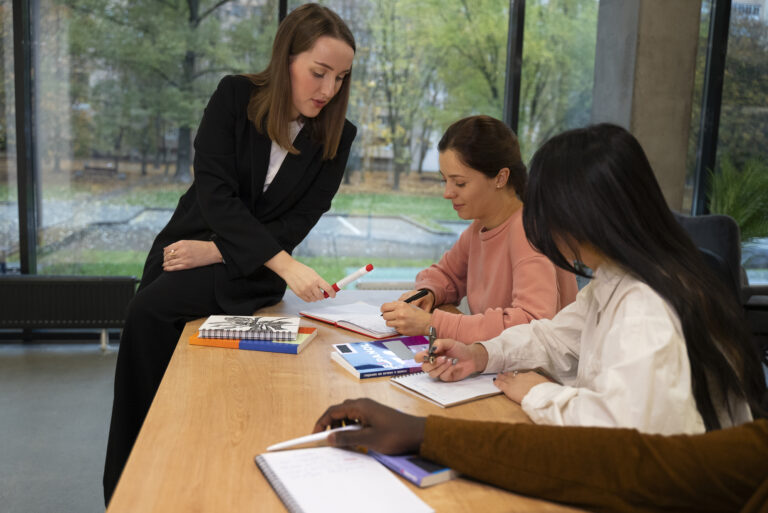Scholarship of Learning: A Comprehensive Guide to Its Importance and Impact 2025
Introduction to Scholarship of Learning
The idea of Scholarship of learning stresses a careful and self-reflective way of learning about, refining, and sharing teaching methods. Thinking critically about how learning occurs , how information is generated, and how to make teaching best is just as important as teaching and learning in the classroom. The technique has gained popularity in academic circles due to its assertion that knowledge serves as both a transformative process and a vehicle for knowledge dissemination.
It is especially vital in today’s fast-paced academic world, where new ideas are needed to solve problems around the world. It brings together teachers, students, and researchers to give a whole picture of education, closing the gap between theory and practice. By carefully studying how people learn, researchers, teachers, and students can compare old and new ways that are based on data.
This website goes into great length on the Scholarship of Learning, including what it is, where it came from, what it does, what problems it has, and what impacts it will have on society and higher education in the long run.
Historical Background of Scholarship of Learning
The Scholarship of Learning started in the late 1900s, mostly because of Herbert Boyer’s work. He argued that scholarship should extend regular research. It ought to involve learning more, using what you’ve learnt, and trying new stuff . Boyer’s paradigm contested the strict division between research and teaching, positing that teaching could and ought to be regarded as an educational endeavour.
The program is of the Scholarship of Learning came from this idea. It is a method of thinking about educational research that sees teaching and learning as very important components of academic life. This concept has been utilized in educational institutions throughout for numerous years. It has been a part of plans for schools, programs to train instructors, and techniques to teach.
The historical evolution of the Scholarship of Learning illustrates its importance as an ongoing pursuit rather than a fixed concept. It changes all the time to keep up with new technology, educational methods, and the demands of both students and teachers.

The Core Principles of Scholarship of Learning
Critical Inquiry into Learning
The Scholarship of Learning requires that teachers carefully look at how students learn. It involves asking important questions about what motivates students and how well different teaching methods work. When teachers ask questions, they learn more about their pupils and can use that information to make their lessons better.
Integration of Research and Teaching
One of the basic assumptions underpinning the Scholarship of Learning is that teaching and research are not two important things. Instead, they are both factors of a bigger process where research helps teaching and teaching makes new research questions. This integration makes sure that classrooms are locations where people learn new things and come up with fresh ideas.
Collaboration and Sharing
The Scholarship of Learning encourages instructors to work together. To keep becoming it better, it’s important to share best practices, publicise results, and talk to one other. Researchers and teachers work together to develop communities that improve education for everyone..
Focus on Student Outcomes
The Scholarship of Learning is different from standard teaching approaches in that it focuses at how teaching influences students’ intellectual and personal progress. This student-centered approach makes sure that learning is meaningful, available to everyone, and can change lives.
Continuous Reflection
The Scholarship of Learning encourages instructors to work together. It’s crucial to talk to each other, share best practices, and make the outcomes known to keep things becoming better. Researchers and teachers work together to develop communities that improve education for everyone.
The Importance of Scholarship of Learning in Modern Education
In today’s knowledge-based society, the Scholarship of Learning has a large efffect on education. It supports students learn how to be creative, think critically, and solve issues , in addition to just memorizing things. There are many ways to stress how important the idea is:
It first makes teaching a practice based on real facts. Teachers largely use research, data, and reflective practices to decide how to teach instead of just following tradition or their gut feelings.
Second, the Scholarship of Learning helps students and teachers get to know one other better. It creates a student-centered strategy that focuses on diversity, inspiration, and involvement by putting learning outcomes first.
Thirdly, it makes sure that the education is still helpful in today’s world. It maintains the education up to date and focused on the future by continually adapting to the new information, technology, and social requirements which is provided by learning.
Lastly, it makes the institution more effective and gives it a better reputation. A university or institution that adopts the Scholarship of Learning shows that it is committed to high standards, new ideas, and being responsible in education.

Scholarship of Learning and Faculty Development
The Scholarship of Learning is one of the best things that has happened to faculty development. For a lot of teachers, teaching might feel like something they do alone. But when teaching is seen as research, it becomes part of a bigger, more collaborative conversation.
Workshops, seminars, and conferences that focus on the Scholarship of Learning get teachers to share what they know and learn from each other. It makes it possible for faculty members to keep learning and enhancing their teaching skills all the time.
The Scholarship of Learning also helps teachers move up in their careers. Publishing in academic publications, doing peer review, and doing research on teaching methods not only make teaching better, but they also help teachers become noticed and move along in their careers.
The Role of Technology in Scholarship of Learning
Technology has changed the way the Scholarship of Learning works in a big way. Digital technologies, internet platforms, and data analytics have given teachers more chances than ever to try out, improve, and test their teaching methods.
Learning management systems (LMS) let you keep an eye on how well students are doing, how interested they are, and how much they are participating. These insights help teachers change how they teach so that it is based on facts instead of guesses.
Also, online platforms make it easier to work together and share. Teachers from all around the world can talk to each other about how to improve learning, share what they’ve learned, and learn from each other.
Digital advancements like virtual classrooms, adaptive learning platforms, and artificial intelligence also help the Scholarship of Learning. These technologies make it more likely that teachers will be able to give each of their students the individualized attention they require.
Challenges Facing the Scholarship of Learning
The Scholarship of Learning has a lot of potential, but it also has a lot of problems to deal with:
Not being recognized by some academic institutions is a big problem. People frequently put a lot of value on research, but teaching may not always get the same level of respect or support. This imbalance may make teachers less likely to get deeply involved in the Scholarship of Learning.
Another problem is time. Faculty members frequently balance teaching, research, and administrative responsibilities. It can be hard to find time to do systematic research on how to teach.
There are also problems with resources and assistance. Not all schools have the money, training, or facilities they need to promote the Scholarship of Learning in a meaningful way.
Lastly, people still don’t want to change. Some teachers can be afraid to try new things or challenge old ways of doing things, which could slow down the advancement of this movement.
Long-Term Impact of Scholarship of Learning
The Scholarship of Learning has a big effect on the long term. By making teaching a form of scholarship, it makes sure that educational methods are always changing and getting better. This leads to improved learning outcomes, students who are more interested in what they’re studying, and teachers who are happier with their jobs.
The Scholarship of Learning also has an effect on society as a whole by creating graduates who are better able to deal with difficult problems. It helps people become critical thinkers, innovators, and leaders who can make a difference in their communities.
Institutions that support the Scholarship of Learning also stand out in the world of education. They are more likely to attract the best faculty, students, and collaborations, which will help them stay at the top of higher education.Scholarship of Learning and Professional Development
Professional growth for educators is directly tied to the Scholarship of Learning. Teachers who engage with it gain recognition for their teaching contributions, open opportunities for promotion, and participate in academic discussions that shape future pedagogical directions. This focus ensures that professional development is not an isolated process but an integrated part of scholarly life.
Impact on Student Learning Experiences
One of the most important outcomes of the Scholarship of Learning is its direct effect on students. By fostering inquiry-based teaching and reflective practices, students benefit from environments where they can explore, question, and connect their learning to real-world issues. It helps create lifelong learners who are adaptable and ready for future challenges
Global Perspectives on Scholarship of Learning
Across the world, different countries and institutions interpret the Scholarship of Learning in unique ways. While some focus heavily on integrating it into teacher training, others emphasize collaborative research and publications. The global perspective demonstrates that while the principles remain universal, their application can be flexible, reflecting cultural and institutional contexts.

Future Directions of Scholarship of Learning
Looking ahead, the Scholarship of Learning will continue to evolve with technological progress, interdisciplinary research, and global academic collaboration. Its future lies in greater recognition of teaching as scholarship, deeper use of learning analytics, and stronger emphasis on inclusive education that addresses diverse student needs.Relationship Between Scholarship of Learning and Curriculum Design
Curriculum design is not only about listing topics but about shaping experiences. This ensures curricula are dynamic, research-informed, and student-centered. It allows educators to integrate critical thinking, creativity, and interdisciplinary learning.
Conclusion
The Scholarship of Learning is a new way of thinking about education. It redefines teaching and learning as academic activities that stress evidence, reflection, collaboration, and new ideas. Even though there are problems, the benefits far exceed the problems, making it an important idea for teachers, schools, and society as a whole.
This will always be a guiding idea as education changes to keep up with developments across the world. It makes sure that teaching is not simply a job, but a lifetime commitment to learning, growing, and doing your best.
FAQs
1. What is the Scholarship of Learning?
The Scholarship of Learning is an approach that treats teaching and learning as scholarly activities, emphasizing reflection, evidence-based practices, and continuous improvement.
2. Why is the Scholarship of Learning important?
It improves teaching quality, enhances student outcomes, fosters collaboration, and ensures education remains relevant in a rapidly changing world.
3. How does technology support the Scholarship of Learning?
Technology enables data-driven insights, facilitates online collaboration, and provides innovative tools like adaptive learning systems to personalize education.
4. What challenges does the Scholarship of Learning face?
Challenges include lack of recognition, limited time for faculty, insufficient resources, and resistance to change in academic institutions.
5. How does the Scholarship of Learning benefit students?
Students gain from more effective teaching methods, greater engagement, improved learning outcomes, and preparation for real-world challenges.







